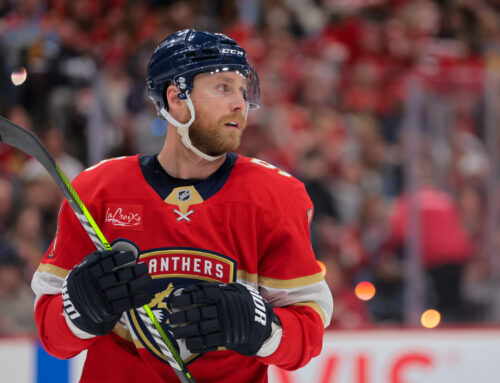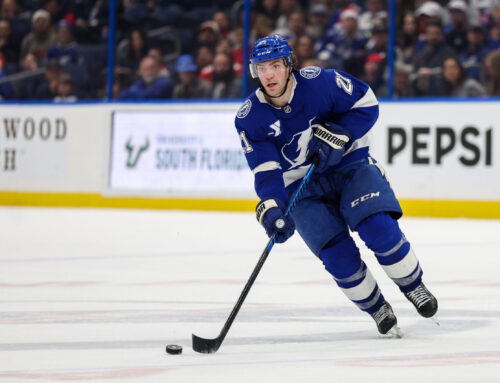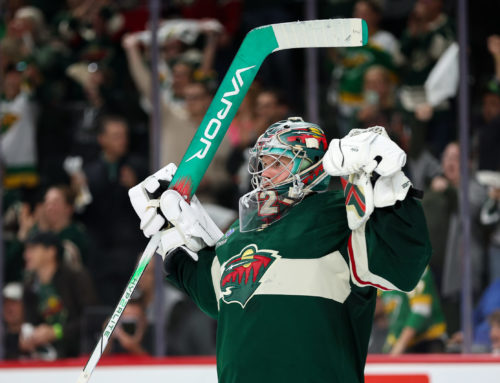
Why Blake Wheeler is better to own in fantasy hockey than Jordan Eberle
Sticking with my recent trend of wingers vs. wingers, this week's match features two who've become cornerstones for their respective teams despite their fairly young ages – Blake Wheeler and Jordan Eberle. Which one is better for your squad, and can we expect either to become a consistent point per game player? Time to find out – Cage Match is underway!
Career Path and Contract Status/Cap Implications
Wheeler has been with the Jets/Thrashers for enough time that many might forget his early career drama, which initially consisted of being drafted fifth overall in 2004 by Phoenix but then never coming to terms, making him a free agent in summer 2008. He was snapped up by the Bruins, where – more drama – he fizzled, topping out at 45 points as a rookie and ultimately being dealt to the Thrashers in winter 2011. There he immediately thrived, with 17 points in 23 games and then moving up the NHL points leaderboard each successive year (41st in scoring for 2011-12, 29th in 2012-13, 19th in 2013-14).
At 24, Eberle is nearly four years younger than Wheeler and also was a former first rounder (22nd in 2008). Eberle jumped from juniors to the NHL for 2010-11, posting 43 points in 69 games. But in 2011-12 Eberle exploded for 76 points in 78 games, leading to visions of him being a superstar for the Oilers, who by then had also drafted two first overall picks in Taylor Hall and Ryan Nugent-Hopkins. But Eberle's production fell back a bit over the last two seasons, posting 102 points in 128 total games (a 65 full season point pace) and leaving some to wonder when – or perhaps even if – his 76 point campaign will be equaled, let alone surpassed.
Wheeler's success led him to be rewarded with a six year, $33.6M deal ($5.6M yearly cap hit) that runs through the 2018-19 campaign. Eberle's own six year deal also runs through 2018-19 and, at $36M, brings with it a nearly identical $6M per year cap hit.
Ice Time
Although Wheeler played 58 games with Boston in 2010-11, that's largely irrelevant for our current Ice Time analysis, so I'll just include data for his 23 games with Atlanta that season. For Eberle, we can focus on whether his 2011-12 production might've been owed to higher Ice Time that season versus others.
|
Season |
Total Ice Time per game (rank among team's forwards) |
PP Ice Time per game (rank among team's forwards) |
SH Ice Time per game (rank among team's forwards |
|
2013-14 |
18:41 (BW) – 4th 19:32 (JE) – 3rd |
2:37 (BW) – 3rd 3:02 (JE) – 2nd |
0:51 (BW) – 8th 0:41 (JE) – 9th |
|
2012-13 |
18:48 (BW) – 4th 18:59 (JE) – 2nd |
2:36 (BW) – 2nd 3:11 (JE) – 2nd |
0:20 (BW) – 9th 0:11 (JE) – 9th |
|
2011-12 |
19:04 (BW) – 3rd 17:35 (JE) – 6th |
2:38 (BW) – 2nd 3:00 (JE) – 2nd (tie) |
0:10 (BW) – 9th 0:10 (JE) – 8th |
|
2010-11 |
18:52 (BW) – 3rd 17:40 (JE) – 6th |
2:10 (BW) – 6th 2:32 (JE) – 7th |
1:13 (BW) – 5th 0:40 (JE) – 8th |
Surprisingly, Eberle's 76 point 2011-12 campaign actually came in the season where he received the least overall Ice Time. Seeing that, I figured maybe he had a lot more PP Ice Time or much less SH Ice Time in 2011-12; but his 3:00 PP Ice Time was essentially the same as 2012-13 and 2013-14 and his 0:10 SH Ice Time for 2011-12 was nearly identical to 2012-13. While we'll have to see the extent to which luck might've contributed to Eberle's 2011-12 production, his inability to duplicate it when receiving equal (if not more) Ice Time in 2012-13 and 2013-14 is concerning in and of itself.
Wheeler's Ice Time numbers have been very consistent, particularly his overall Ice Time, which has ranged a mere 0:23 from his highest (occurring in 2011-12) to his lowest (occurring this past – and most productive – season). What's more, during his three full seasons with the Thrashers/Jets, his PP Ice Time was literally the same (ranging all of two seconds per game from highest to lowest). And lastly, although his SH Ice Time has crept back up from 0:10 in 2011-12 to 0:51 this past season, that hasn't seemed to affect his production, which, as noted above, has seen him move upward in NHL scoring each season.
So why is it a positive when Wheeler posted his career high in his lowest overall Ice Time season, but a negative when Eberle did the same? Simple – Wheeler did it last season as part of an overall upward trend in points, while Eberle did it three seasons ago and has done comparatively worse in the next two seasons despite getting more Ice Time.
Given his contract and where the Jets are as a team, Wheeler should continue to receive similar Ice Time, if not more. No ifs, ands or buts – if you own Wheeler this Ice Time data is extremely positive for at least the near term. There's more concern regarding Eberle, as although he's scored at a very decent 65 point pace (102 points in 128 games) over the past two seasons you never can be happy about seeing lower production as a player matures and gets additional Ice Time.
Secondary Categories
For these numbers, Wheeler's 2010-11 data again was solely for his 23 games with the Thrashers.
|
Season |
PIM (per game) |
Hits (per game) |
Blocked Shots (per game) |
Shots (per game) |
PP Points (per game) |
|
2013-14 |
0.77 (BW) 0.22 (JE) |
1.83 (BW) 0.64 (JE) |
0.83 (BW) 0.50 (JE) |
2.74 (BW) 2.50 (JE) |
0.23 (BW) 0.25 (JE) |
|
2012-13 |
0.85 (BW) 0.33 (JE) |
1.87 (BW) 0.64 (JE) |
0.81 (BW) 0.33 (JE) |
2.69 (BW) 2.77 (JE) |
0.14 (BW) 0.19 (JE) |
|
2011-12 |
0.69 (BW) 0.13 (JE) |
1.41 (BW) 0.57 (JE)
📢 advertisement:
|
0.57 (BW) 0.31 (JE) |
2.60 (BW) 2.31 (JE) |
0.19 (BW) 0.25 (JE) |
|
2010-11 |
0.61 (BW) 0.32 (JE) |
0.78 (BW) 0.46 (JE) |
0.52 (BW) 0.24 (JE) |
3.39 (BW) 2.29 (JE) |
0.13 (BW) 0.16 (JE) |
Simply put, this was a rout. Wheeler destroys Eberle in PIM and Hits, and holds a sound – but not quite as wide – lead in Blocked Shots. And even in Shots, Wheeler topped Eberle in three of the four seasons, although the 3.39 in 2010-11 shouldn't be relied upon too heavily due to the small 23 game sample size.
Wheeler's Hits output in particular is a rare commodity among top 25 scorers, and puts him in fine company with the likes of Ryan Getzlaf, Alex Ovechkin, and Chris Kunitz. Meanwhile, Eberle's value takes a hit (pun intended) for all but points-only leagues or ones that somehow don't count his weak areas.
Eberle's saving grace is PP Points, as he's put up better numbers than Wheeler in each of these seasons, although it's worth noting that the edge he holds is much less than Wheeler's in all other categories except Shots. And what's also good for Eberle (and his poolie owners) is that in 2013-14 he equaled his PP Points output from 2011-12, making his nearly point per game numbers from 2011-12 look less aberrational. But we'll still need to check his luck-based numbers, which we'll do next.
Luck-Based Metrics
As noted below, some of this data is specifically for 5×5, while Personal Shooting % is for all situations; and there's also 5×4 IPP. Also, in this case Wheeler's 2010-11 data is combined for Boston and Atlanta.
|
Season |
Personal Shooting Percentage |
Team Shooting Percentage (5×5) |
PDO (5×5) |
IPP (5×5) |
IPP (5×4) |
|
2013-14 |
12.4% (BW) 14.0% (JE) |
8.80% (BW) 9.43% (JE) |
1008 (BW) 1000 (JE) |
82.0% (BW) 74.0% (JE) |
77.3% (BW) 72.0% (JE) |
|
2012-13 |
14.7% (BW) 12.0% (JE) |
10.85% (BW) 8.78% (JE) |
993 (BW) 985 (JE) |
71.4% (BW) 81.8% (JE) |
70.0% (BW) 50.0% (JE) |
|
2011-12 |
8.2% (BW) 18.9% (JE) |
8.78% (BW) 12.84% (JE) |
990 (BW) 1029 (JE) |
67.2% (BW) 84.4% (JE) |
68.2% (BW) 56.7% (JE) |
|
2010-11 |
9.0% (BW) 11.4% (JE) |
7.94% (BW) 7.19% (JE) |
1007 (BW) 975 (JE) |
80.4% (BW) 87.9% (JE) |
71.4% (BW) 66.7% (JE) |
In looking at the 2011-12 data for Eberle, the news isn't very good. On the one hand, he had his lowest IPP numbers for both 5×5 and 5×4 in 2011-12, which would seem like good news until you consider that if his IPP was higher in other years then why didn't he score as many points?
The answer probably lies in his other metrics, namely his 1029 PDO at 5×5, which is more than 40 higher than the average of his other three seasons. Also, his Shooting % numbers for 2011-12 were both quite high; in fact, if he had posted his career average (14.3%) for Personal Shooting % in 2011-12, then that would've translated to nine fewer goals, which in turn would've put him at 67 points, which is right near his scoring output for his past two seasons. Coincidence? I think not.
For Wheeler, there are no Shooting % issues, as all have been reasonable both in general and with respect to his career averages. And his PDO has ranged less than 20 points in all four years, and never even approached the 1030 upper limit of normal.
Wheeler's IPP has been inching higher each season however, landing at 82.0% for 5×5 and 77.2% for 5×4 for 2013-14. Realistically, you have to think he's either reached his IPP ceiling or is very close to having done so. That, plus his consistent PDO and Shooting % numbers, suggest that he might not be a candidate to finish much higher than his 69 points form 2013-14, at least not until/unless Winnipeg improves its team offense (15th in team scoring, 25th in PP conversion %).
Who Wins?
One thing we can be pretty clear on – Wheeler's production over the past few seasons has not been a fluke. But at the same time, and as I said right above, he might've reached (or neared) his realistic points ceiling in 2013-14. That being said, you should pencil him in for 65-70 points in 2014-15, with a slightly greater chance at climbing to 70-75 than sliding down to 60-65 due to factors such as there being a higher likelihood of Winnipeg improving offensively as a team rather than getting worse.
The issue with Eberle is he had a big splash in 2011-12 and then twice finished right near a 65 point pace, which, coincidently, was right where he would've scored in 2011-12 had he posted his career Personal Shooting %. And he did this while getting the same (or better) productive Ice Time in the past two seasons, which is not a good sign. Of course Edmonton fared even worse than Winnipeg in team offense in 2013-14 (25th in scoring, 21st in PP conversion %), which means Eberle could reap similar "along for the ride" type of benefits as Wheeler.
In a nutshell, you have two players who – barring injury or very good or bad luck – should give you 65-70 points next season. Given that, I think Wheeler wins this Cage Match.
Clearly Wheeler is the better option in multi-cat leagues in view of his far better Hits, PIM, and Blocked Shots numbers. But even in points only leagues I'd probably give the edge to Wheeler, since Eberle's 76 point sophomore season and younger age tantalizes poolies and, in turn, causes them to overvalue Eberle. Meanwhile, Wheeler and his "steady eddie" output are devalued because he's never made a big splash and isn't a particularly flashy player.
Resist the urge to draft or trade for Eberle unless he slumps this season, in which case he could become a bargain. If you have Eberle in a keeper league, then hold and hope for the best. As for Wheeler, you shouldn't need to draft him with other 65-70 point players in points only leagues, as chances are he'll slide a bit. But it's a different story in a multi-cat league, as you'll likely want to take him near 70-75 point players given his downside of 65-70 plus his excellent contributions in key non-points categories.
| Marian Hossa vs. Jason Pominville | |||
| Ryan Suter vs. Niklas Kronwall | |||
| Patrick Kane vs. Phil Kessel |





 FLA
FLA CHI
CHI NYR
NYR PIT
PIT L.A
L.A COL
COL CBJ
CBJ TOR
TOR MTL
MTL ANA
ANA
 PHI
PHI VAN
VAN WSH
WSH
